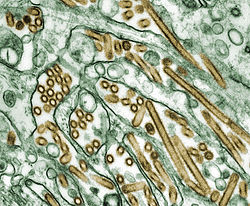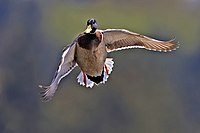WHO says spread of Bird Flu among humans limited
Saturday, December 22, 2007

The World Health Organization (WHO) says limited human-to-human transmission of the H5N1 avian influenza virus may have occurred in Pakistan, but it says the threat of further spread appears to have stopped as no new infections have been reported for two weeks.
Assistant Director-General of the World Health Organization and top bird flu expert, Doctor David Heymann, says a team of WHO experts has completed an investigation into an outbreak of bird flu in Pakistan. He says tests were carried out among a group of people who became infected with the deadly H5N1 strain of the virus in October.
Doctor Heymann says an analysis of the information is not yet complete, but preliminary results indicate there was human-to-human transmission of the virus. He says there could have been a common source of the infection.
"The team feels, we have not seen all their evidence yet, but they feel that this could be an instance of close contact of human-to-human transmission in a very circumscribed area and not sustained," he explained. "Just like happened in Indonesia and in Thailand."
Nine people, including five brothers, became infected with the H5N1 bird flu virus in a small town north of Islamabad. One was a vet involved in culling sick poultry. Two of his brothers fell ill and died. The vet and his other two brothers subsequently recovered.

Image: Yann Forget.
Doctor Heymann says H5N1 remains an animal disease. He says there have been only occasional instances where human-to-human infections have occurred.
The World Health Organization reports at least 209 people have died worldwide from the virus, most in Indonesia. Scientists fear the H5N1 or another as yet unidentified virus could mutate into a form that could easily spread the disease among humans.
Doctor Heymann says there were three avian flu pandemics in the last century and other pandemics before then. He says there is a clear understanding in the scientific community that there will be another pandemic of influenza.
"We do not know what virus will cause that, but we know there are avian influenza viruses out there and those viruses could cause a pandemic eventually," he explained. "As long as H5N1 is circulating anywhere in the world, there is a chance that that virus can, either through an adaptive mutation or re-assortment, cause a pandemic. The problem is nobody can quantify that risk."
Doctor Heymann says countries have to be prepared to take action when a pandemic strikes and that the World Health Organization is stockpiling H5N1 vaccines.
He says they would be used to vaccinate essential populations, such as health workers and security forces, in countries where the pandemic is starting. He says the vaccines also would be used to vaccinate people in areas surrounding a contaminated zone to try to contain the virus and stop it from spreading.
Sources
- Lisa Schlein. "WHO Says Spread of Bird Flu Among Humans Limited" — VOA News, December 22, 2007
- "No threat of bird flu virus further spreading in Pakistan: WHO" — Pakistan Link, December 22, 2007
